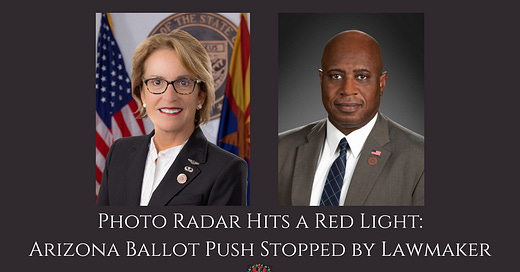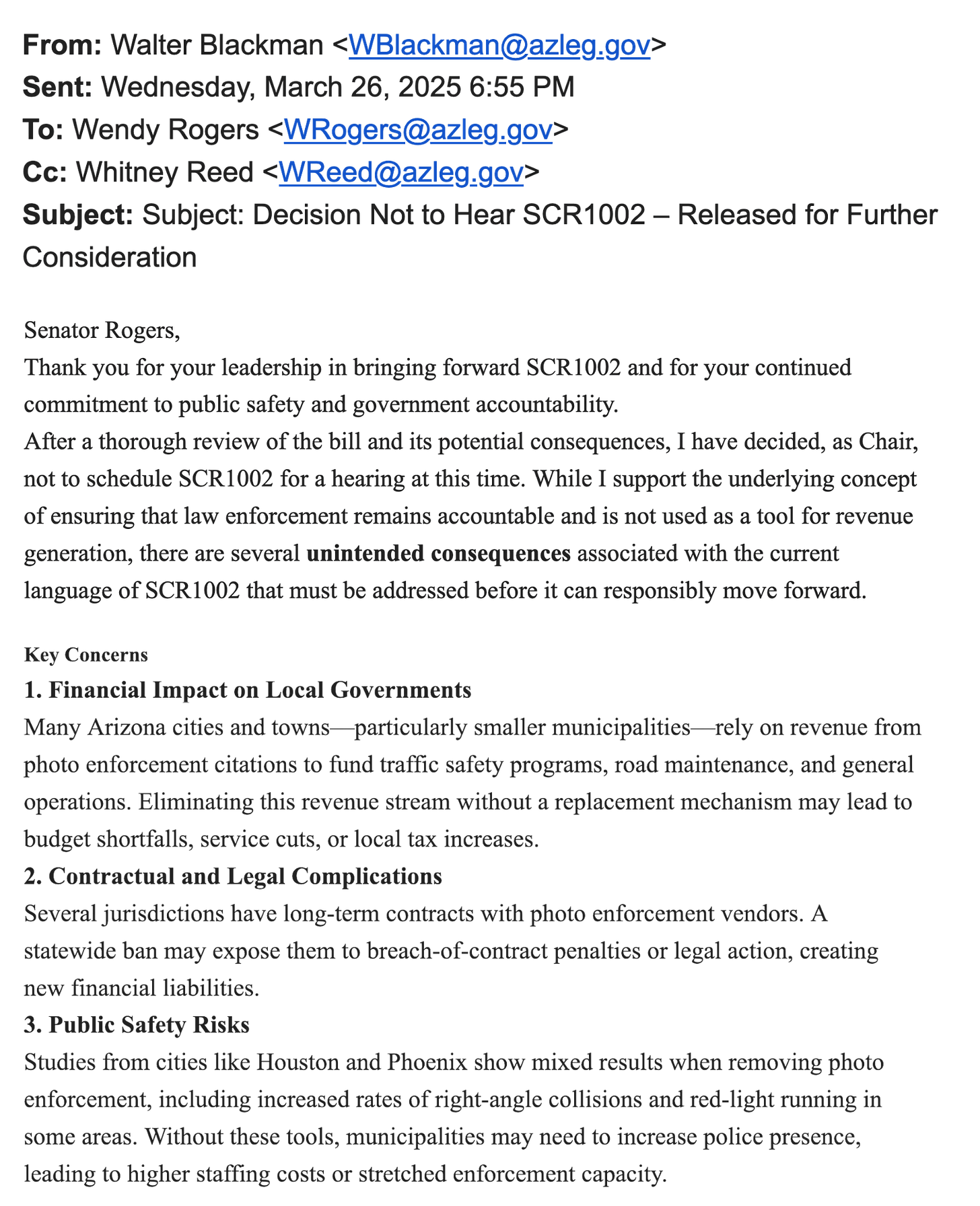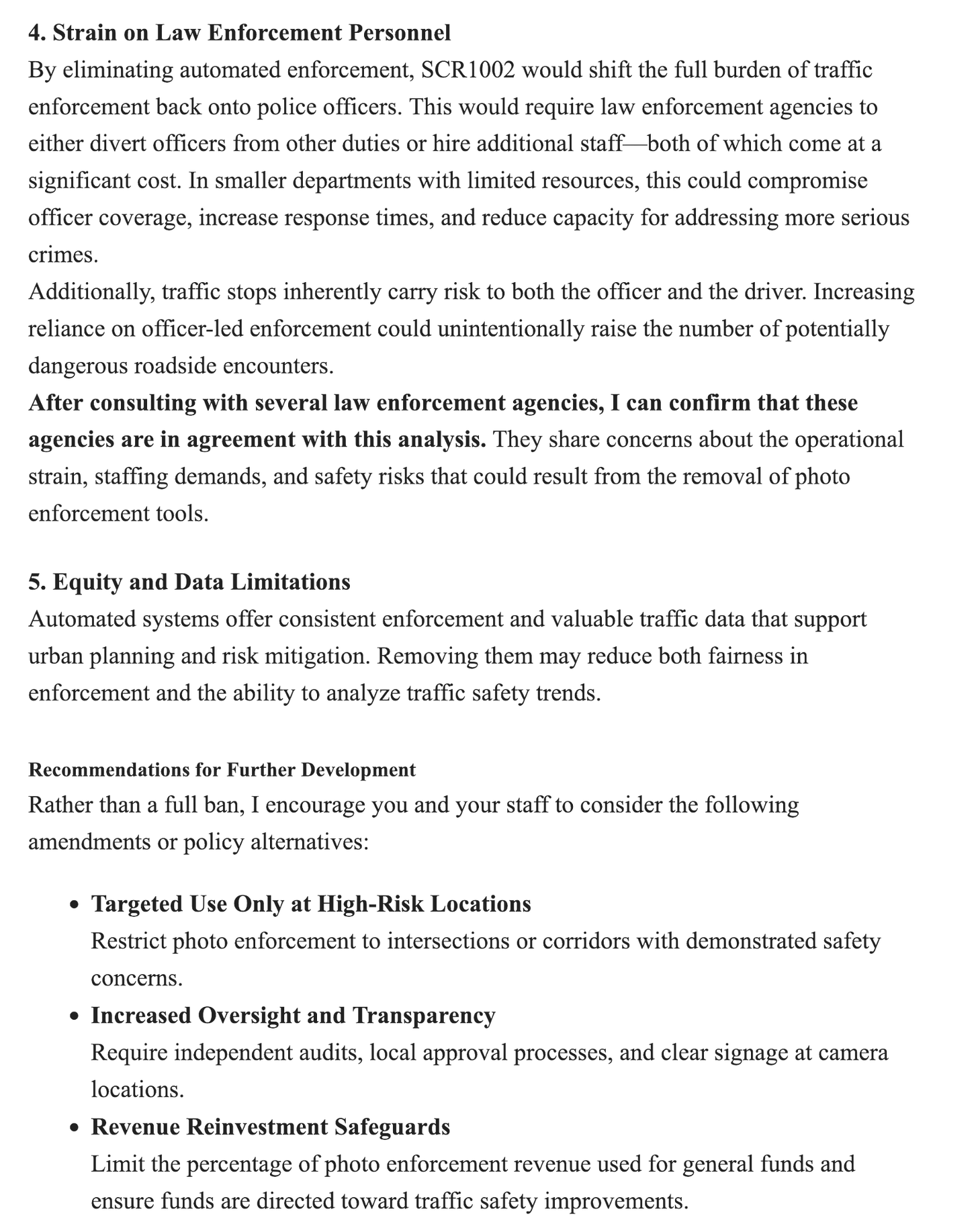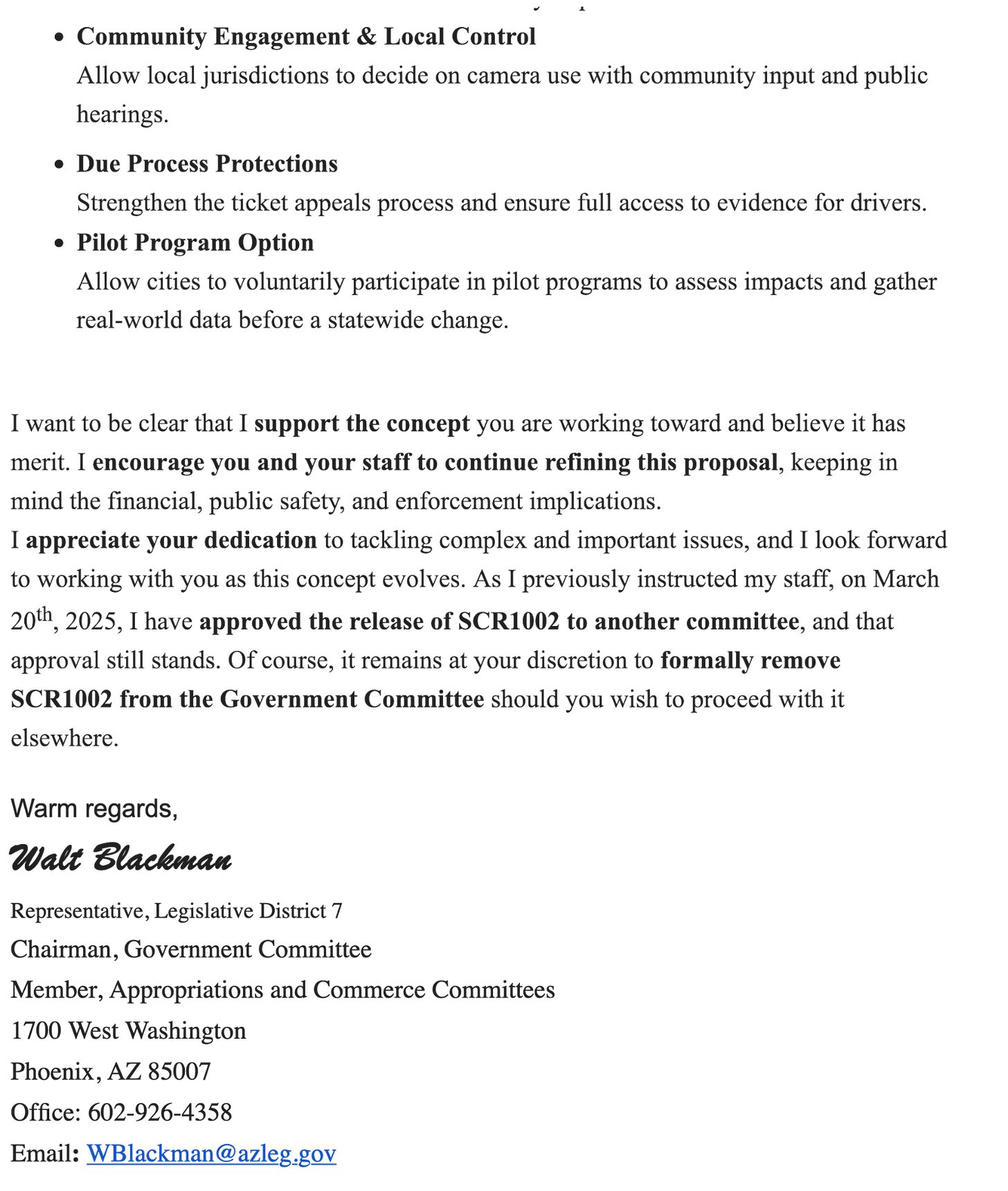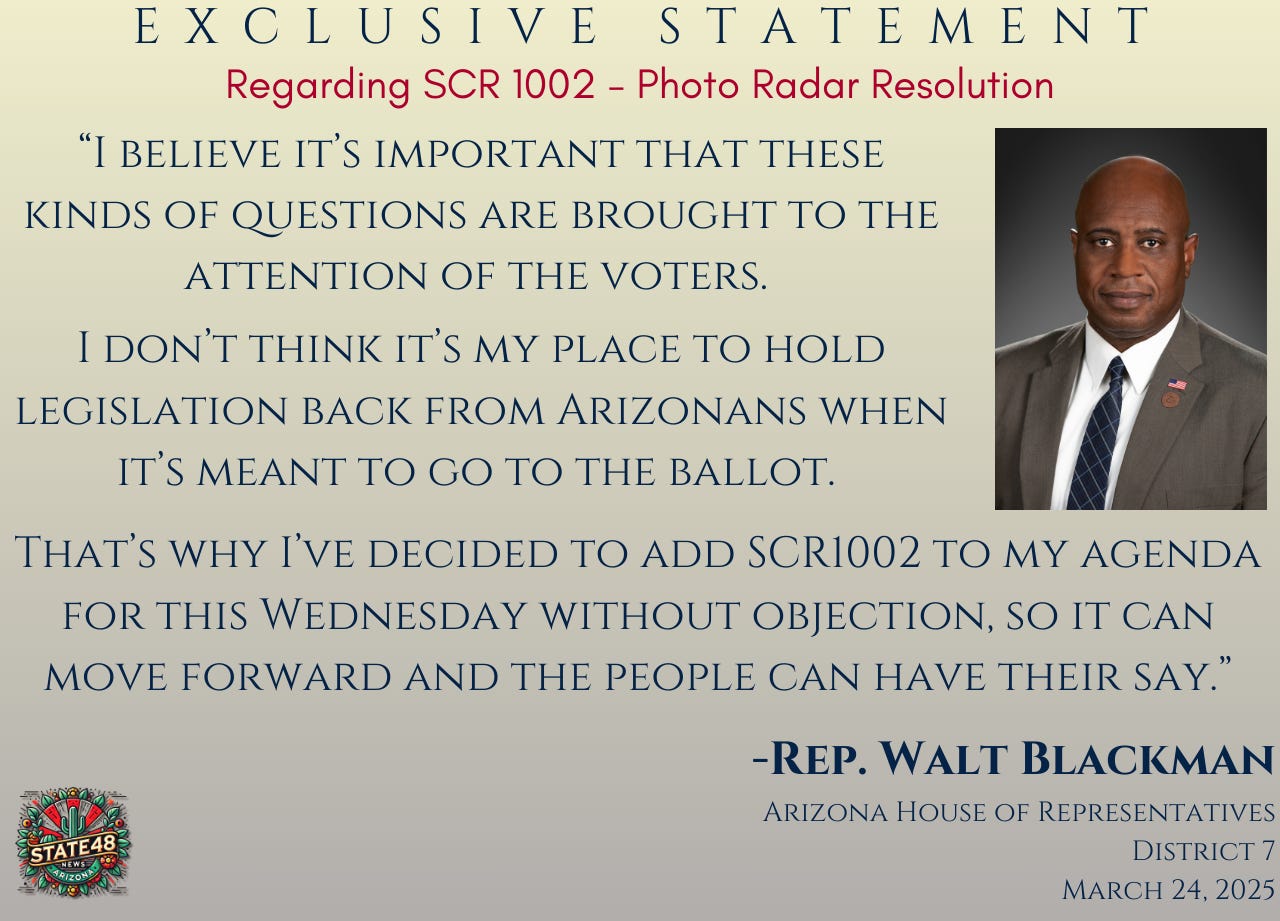Photo Radar Hits a Red Light: Arizona Ballot Push Stopped by Lawmaker
State 48 News obtains letter explaining why the photo radar measure will not go to the people of Arizona for a final say.
For a moment, it looked like Arizona voters might finally get their say on photo radar—a long-debated surveillance tool that stirs up privacy fears and political tension in equal measure. The resolution to put the issue on the ballot sailed through committee after committee, gaining quiet momentum. But just as it neared the final stretch, the road abruptly ended. Not with a bang, but with a vanishing act.
Representative Walt Blackman placed SCR1002 on the agenda for the Government Committee meeting scheduled for Wednesday. However, the committee ran late, and all remaining items were pushed to a special meeting on Thursday. Noticeably absent from Thursday’s agenda was the Photo Radar resolution to let the voters decide its fate.
Also of note: Senator Wendy Rogers held Blackman’s well-known Stolen Valor bill in the committee she chairs. Not long after that move, her own bill—SCR1002—dropped off the calendar.
In a letter obtained by State 48 News, Blackman details his reasons for removing the SCR, despite having previously agreed to hear it. He gives several reasons, none having to do with the Stolen Valor bill, but many see the timing as peculiar.
🚨 Rep. Blackman’s House Government Committee is holding a Special Meeting this afternoon to take up bills left unheard from yesterday—with one notable exception: SCR 1002 is off the agenda.
The Stolen Valor proposal had a planned striker weeks ago and is expected to receive a vote on the Senate floor. The path forward for SCR1002, however, remains unclear. Blackman has since released the bill to another committee. If Rogers can find a favorable chair willing to hear the measure, she still has a narrow window to revive it. Alternatively, Blackman could reconsider and call a special meeting for Friday, though that seems unlikely at this point.
How The Effort Began Losing Steam Long Before Hitting This Dead End
Is it a surprise the photo radar measure is dead? Not really.
Looking back, sending photo radar to the ballot for the people to decide has been in jeopardy this whole time.
It all came to a head last week when Arizona House Speaker Steve Montenegro double assigned SCR 1002 to two committees… when it only needed to be assigned to one. And one of the committees it's assigned to is chaired by Rep. Walt Blackman (R-LD7) who has the beef with the resolution’s sponsor, Sen. Wendy Rogers, over Stolen Valor legislation.
On Monday, State 48 News pressed Government Committee Chair Rep. Blackman for answers about his motives in scheduling the photo radar resolution. In his statement, the key words appear to be “without objection.” SCR 1002 eventually appeared on yesterday’s committee with an asterisk “Consideration pending unanimous consent pursuant to House Rule 9(C)(4).”
The rule states, “The committee Chairman (presiding officer) shall prepare committee agendas. Absence of a measure from the timely posted committee agenda will prohibit its consideration unless unanimous consent of all committee members is obtained. Unless a reconsideration motion has been offered and failed, a Chairman may place a measure that failed in committee on any subsequent agenda.”
Here is what happened in yesterday’s meeting. Blackman said SCR 1002 would be rescheduled for today.
By 5pm last night, SCR 1002 was missing from today’s committee agenda.
After 11pm last night, Blackman posted to X.
Confusion Swirls Over Photo Radar Revenue as Cities Push to Keep Control Local
Achieving unanimous consent on any photo radar bill would always be tricky. As State 48 News first reported in February, traffic photo enforcement brings in big bucks. Cities and towns can make millions by issuing photo radar citations... and in Arizona, a portion of photo radar fines go to Clean Elections which finance candidates’ campaigns. This is why it gets the nickname, "cash cow."
Photo radar critic Shawn Dow brought the issue into the spotlight after a communications misfire with Sen. Shope escalated—boiling over and hitting the airwaves that same night.
Proponents of photo radar—cities and police departments across Arizona—insist the cameras encourage drivers to slow down and boost street safety. But in Paradise Valley, a town that’s had photo radar in play for several years, even the mayor admits he recently got caught going 11 MPH over the speed limit.
In documents obtained by State 48 News, 11% of each photo radar ticket's fine in Paradise Valley, Arizona is allocated to the state's Clean Elections Fund, which provides public financing for political campaigns. And $75 from every photo radar ticket goes straight back into funding the photo radar program itself. If that same red-light running ticket is issued by a police officer instead of a photo radar system, the fine revenue goes directly to the town’s general fund—not back to the photo enforcement.
In a pivotal hearing on photo radar, Arizona lawmakers grilled Jay Kaprosy of Veridus, the lobbying firm for Verra Mobility—Arizona’s top photo radar vendor. Committee Chair Rep. Leo Biasiucci cut straight to the point: “Are you scanning every single license plate, even if no violation occurs?” Kaprosy dodged, claiming data is only kept if a violation is triggered, sidestepping the core privacy concern.
The non-answer drew visible frustration from longtime critics Shawn Dow and Jay Beeber, seated behind him. Kaprosy also faced tough questions on data collection, driver privacy, and Verra’s influence over speed limit decisions in enforcement zones.
Representatives from several police departments have pushed to keep photo radar under local control, arguing that each municipality should decide for itself.
Despite growing concerns, the issue doesn’t just divide Democrats and Republicans—it pits Republicans against each other.
In February, State 48 News reported Sen. Payne co-sponsored SB1146 with Sen. Frank Carroll - both Republicans - a bill to expand automated traffic cameras, let private vendors tack on fees beyond the $350 cap, and hold vehicle owners automatically liable, regardless of who was driving. The move sparked backlash, especially since both senators had opposed photo radar back in 2019.
Sen. Shope called the move to expand photo radar surprising, pointing to voter data from Peoria and Tucson—both cities that repealed photo radar with broad bipartisan support. He argues that the issue transcends party lines, with Republicans, Independents, and Democrats all backing its removal.
"If you're really taking the pulse of the people," Sen. Shope said, "you should let them have the final say and put the nail in the coffin on this thing."
The bill to expand photo radar is now dead, too, with no further hearings scheduled. Sen. Payne cancelled our interview and Sen. Carroll never responded to our requests for comment.
THE MORE YOU KNOW.
Nearly two decades.
Photo radar has landed before Arizona lawmakers almost every year for the past twenty years. This year, it's come closer than ever to being banned - or at least going to the voters.
Blackman’s key concerns have been aired, addressed, and debated in every committee stop along the way. And still—each one moved the bill forward.
So, what now? Unless Rep. Blackman has a last-minute change of heart and puts it on tomorrow’s agenda, photo radar is dead. The only other path? Sen. Rogers would need to find another House committee willing to take it up.
Governor Hobbs supports photo radar, making it likely she’d veto any legislation to ban it outright. That’s why a resolution putting the issue in voters’ hands was gaining traction.
State 48 News will keep following this story as it unfolds.


